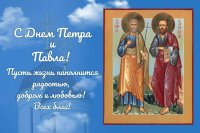 The Feast of Peter and Paul, also known as the Feast of Saints Peter and Paul, is celebrated on July 12 in the Orthodox and Catholic Churches. This feast is dedicated to the memory of two of the greatest apostles, Peter and Paul, who played key roles in spreading Christianity and establishing the early church.
The Feast of Peter and Paul, also known as the Feast of Saints Peter and Paul, is celebrated on July 12 in the Orthodox and Catholic Churches. This feast is dedicated to the memory of two of the greatest apostles, Peter and Paul, who played key roles in spreading Christianity and establishing the early church.
Saints Peter and Paul are among the most revered figures in Christianity. Peter, a former fisherman named Simon, was called by Jesus Christ and became one of his closest disciples. According to Christian tradition, Peter was the first bishop of Rome and became known as the "Rock" (Greek "Petros") upon which Christ promised to build his church.
Paul, formerly known as Saul, was a Pharisee and a zealous persecutor of Christians. However, after a dramatic conversion on the road to Damascus, he became one of the most fervent preachers of Christianity. Paul wrote many letters included in the New Testament and played a key role in spreading the Christian faith among Gentiles.
The Feast of Peter and Paul commemorates their martyrdom in Rome around 67 AD. Peter was crucified upside down at his own request, as he did not consider himself worthy to die in the same manner as Jesus. Paul was beheaded, as he was a Roman citizen and thus exempt from crucifixion.
This feast symbolizes unity and diversity within the Christian faith. Peter and Paul represent two different paths to faith: Peter as a direct disciple of Jesus, and Paul as a converted persecutor turned preacher. Both apostles demonstrate the importance of forgiveness, repentance, and missionary work.
In Orthodox and Catholic Churches, solemn services are held on this day. In the Orthodox tradition, this day marks the end of the Apostles' Fast, which begins one week after Pentecost and lasts until the feast itself.
In the Catholic Church, June 29, the feast day of Peter and Paul, is celebrated as a solemnity with a special Mass. In Rome, large celebrations are held at the basilicas of Saint Peter and Saint Paul Outside the Walls.
The Feast of Peter and Paul is not only a religious event but also an important cultural tradition. It reminds believers of the significance of faith, forgiveness, and missionary activity, as well as the unifying power of Christianity. The memory of these two great apostles continues to inspire millions of people around the world, uniting them in the celebration of a shared spiritual heritage.


